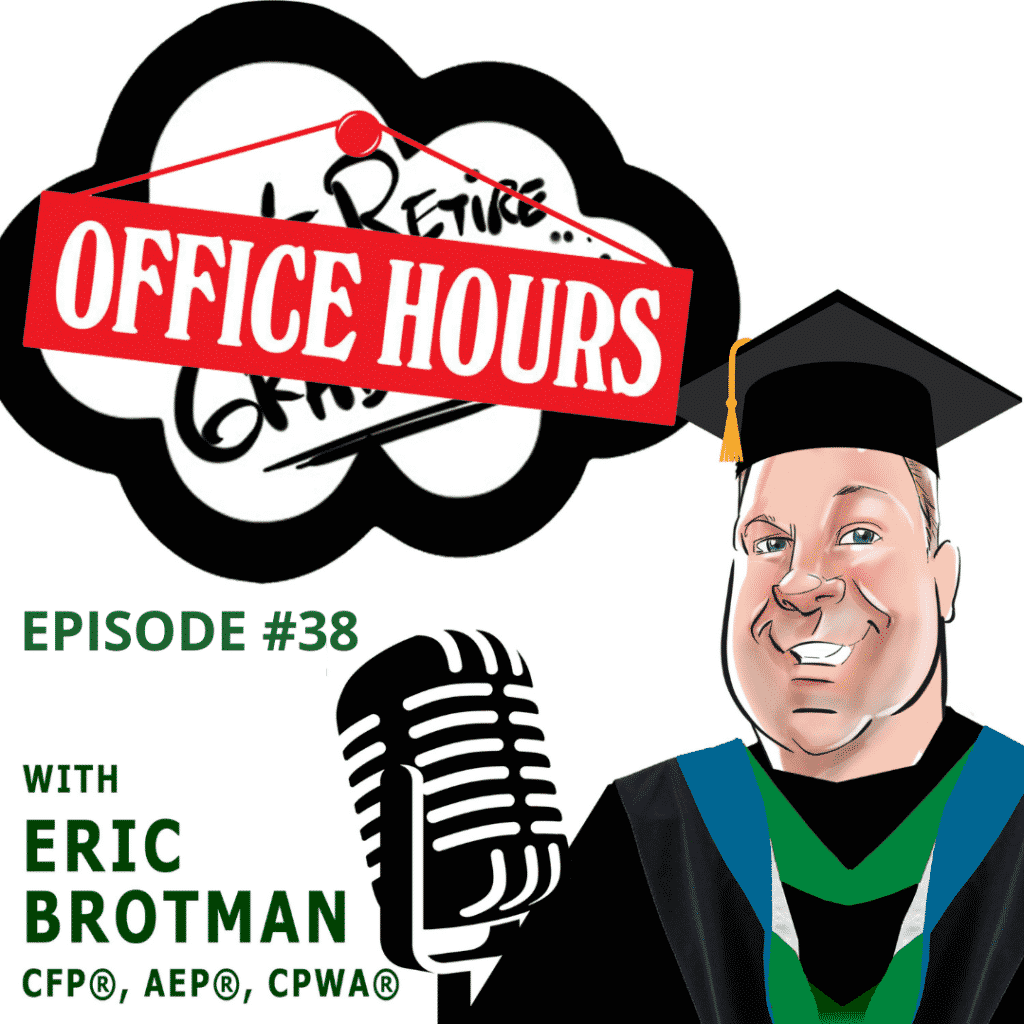Eric Brotman: [00:00:00] This is Eric Brotman, the host of Don’t Retire… Graduate!: the podcast that teaches you how to advance into retirement rather than retreating. Welcome to office hours where we answer listeners’ questions about personal finance, retirement readiness, and more. We received a question from Rachel who asks, do free financial resources actually have value?
Eric Brotman: And Rachel, that is a unbelievably loaded and wonderful question because, uh, certainly value at times is in the, the eye of the beholder. There are some financial resources out there that are free, that I’m sure various people find invaluable and others that maybe are thinly veiled sales pitches, or are really kind of bunk.
Eric Brotman: And so I think a discriminating consumer, even if you’re not paying for something, if you’re a consumer of information and. It’s important. I think to, to discern the difference between something that’s really impactful and valuable to you and something that is noise. And, you know, we spend so much of our lives doing that in so many different ways, whether [00:01:00] it’s a social media feed or whether it’s advertising on, uh, on television or other traditional media, we are bombarded by messages all the time.
Eric Brotman: And sometimes it’s hard to tell an infomercial from real valuable information. So what I would suggest to you is that financial resources don’t have to be expensive. That’s number one. And there are certainly some free financial resources out there online. You just have to be a little bit discriminating and know where you’re looking.
Eric Brotman: So for example if you think about, uh, how the Khan academy has produced, uh, educational programs that are free, you know, they are an established organization that does some terrific education on all different kinds of topics. And so I would feel like, yes, those are free, but also incredibly valuable. They’re also a lot of um, what are called MOOCs, which are these, these massive open programs held by colleges and universities and others where they are in fact free. And they are courses that you can take just to learn about various things. We put out at BFG [00:02:00] university. We put out some financial literacy courses. And the first one that we put out is free and it’s, it’s been free since we launched it and it’s going to continue to be, and it really is just eight lessons on how to understand basic financial literacy.
Eric Brotman: And so I would like to think there’s value in that. Certainly it’s not a commercial for anything. It’s, it’s just, uh, uh, some content that’s been helping young people. I think it’s appropriate for junior high, high school, college, even young adults or those who just want to refresh. I would say that that’s the type of financial resource that, that I hope adds value.
Eric Brotman: There are also lots of white papers, eBooks. There’s a lot of information out on the web and we’ve certainly published, uh, some, uh, at low tax book.com. You can find information about ways to save, uh, where you’re never taxed again on those resources. Uh, I think that’s helpful. There’s also a resource at whatisfp.com, which is all about how do you know what the financial planning process is supposed to be. And it’s not a [00:03:00] commercial, it’s a resource so that you can use that either to do it yourself or to interview somebody if you choose. There are certainly other resources that are trying to upsell you in one way or another, and they’re out there every place.
Eric Brotman: And I think sometimes we get the idea that advice free advice is worth what you paid for it. In other words, that it’s valueless. And so we’re all cynical, we’re all skeptical. And I think that’s a healthy thing to sort of look a little bit cockeyed at something and say, is this legitimate content or not?
Eric Brotman: So, Rachel, I think your question is terrific. The short answer to do free financial resources actually have value is sometimes or maybe. Some of them definitely do. Some of them certainly don’t. And what I would encourage you to do is check out lots of different sources for information, whether it’s, uh, through a, uh, an investment platform through various corporate entities through educational entities, even through our site, whatever you’d like to check out and discern for yourself, what is helpful and what is not.
Eric Brotman: And if you ever decide [00:04:00] you were going to try resources that aren’t free be equally discriminating about what you spend and with whom, and is it reputable? Uh, and I hope that that’s helpful. I wish I could give you a simple binary yes, no answer, but it really doesn’t exist. In some cases you’ll find great value.
Eric Brotman: And in other cases you’ll find none. So Rachel, thank you for your question. A really interesting topic. And if you’d like to send us a question, which we might answer in a future episode of office hours, post it on our Facebook page or tweet us at @Brotmanplanning. If you like, what you hear, please subscribe to our podcast and leave a review on apple podcasts or wherever you listen to your favorite shows.
Eric Brotman: Don’t retire… graduate! Is a book available in print, Kindle and audio formats, and a workbook with all the exercises you need to help build your own financial freedom plan. For more information, go to Brotmanmedia.com or buy your copy and leave us a review on Amazon. Please also check out our online financial literacy education courses bfguniversity.com.
Eric Brotman: Thanks for coming to office hours. Be sure to [00:05:00] tune in for new content every Thursday for now, this is your host, Eric Brotman reminding you don’t retire. Graduate.



